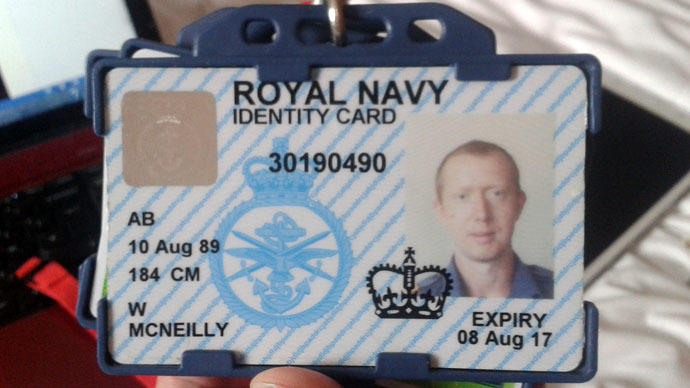Trident whistleblower to ‘turn himself in’ amid concerns over UK leaker’s fate

Treatment of whistleblowers by the UK government has been questioned after recent revelations by a British weapons engineer. The whistleblower went absent after going public with his report on lack of nuclear safety, but says he will surrender on Monday.
READ MORE: ‘Nuclear disaster waiting to happen’: Royal Navy probes Trident whistleblower's claims
William McNeilly, a former Navy officer, went on the run after co-operating with WikiLeaks to post a detailed 18-page report exposing alleged security lapses in the UK’s trident nuclear program. With both the Royal Navy and the police trying to track him down, the whistleblower said he would be handing himself into the police on Monday.
"There’s nothing I can do from prison; whatever happens now is up to you and the government," the man wrote on Facebook under the name William Lewis. Adding that he has been moving between countries, changing his location “almost every day,” the whistleblower said he now "lacks the resources to remain undetected."
#Trident whistleblower: "I don't want to be in prison without anyone knowing the truth": https://t.co/ORFq11d8u6#SNPpic.twitter.com/jl0CnzeKjh
— WikiLeaks (@wikileaks) May 18, 2015
Both experts and the public are now worried about the fate of the
man whose bomb-shell report has not only given rise to concerns
over the country's security, but also questioned the authorities'
attitude towards public service whistleblowers in the UK.
"[If he does hand himself in] I have no doubt he will be
questioned by the Ministry of Defense and disciplinary
proceedings will be taken," Rob Edwards, environmental
journalist for the Sunday Herald told RT, adding that a petition
has been launched in the UK calling for McNeilly's pardon.
Pointing to a disconnect between official government rhetoric
encouraging people to speak out, and what actually happens in
practice when a whistle is blown, a former MI5 agent and
whistleblower Annie Machon told RT that "the UK government
treats whistleblowers appallingly."
"Whistleblowers are the regulators of last resort, when every
other form of accountability and oversights and justice has
failed, we need these brave people to come forward," she
told RT, adding that "whistleblowing is quite an established
culture in the UK."
READ MORE: More than 1,000 people dying needlessly in NHS care - health secretary
Over the years, a number of stories have surfaced about public servants being bullied or sacked for wanting to raise an alarm or highlight wrongdoings. People from both the National Health Service (NHS) and Metropolitan Police Service (MPS) have suffered after exposing ugly truths within their departments.
READ MORE: ‘Shocking treatment’: British MPs call for whistleblower protection
Less than a year ago, the Public Accounts Committee released a
report saying the treatment of public service whistleblowers was
“shocking.”“The abusive treatment and rampant
victimizations of whistleblowers has created a climate in which
large segments of defense and health workers would be afraid to
report departmental malfeasance,” it stated.
The government has also controversially changed the law for civil
servants, forbidding them to speak to the press without prior
governmental approval, in a move union leaders call a direct
threat to whistleblowers. As a result, some British newspapers
have set up a secure service where would-be whistleblowers can
leak their information without fear of retribution.
READ MORE: Macho, bullying British police culture deterring whistleblowers – report
"But if you are coming out of a military or intelligence
agencies, you face not only the ruin of your reputation, the loss
of your career and the loss of your friends and livelihood, you
also potentially or probably face imprisonment too for the breach
of 1989 official secrets act," Annie Machon told RT.
William McNeilly’s disclosures might fall under this law, as it
makes it a crime for anyone coming out of defense or intelligence
to report incompetence on the part of their employers. If the
whistleblower is prosecuted under this act, he faces up to two
years in prison.
Saying that it's not as bad as in the US, where whistleblowers
can be jailed for 35 years, the former UK MI5 agent said “it
is time for an overhaul of the whistleblowers laws and holding to
account the organizations that failed to protect [them].”












